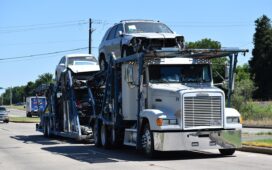In the fast-paced world of e-commerce and rapid urbanization, the demand for efficient last-mile delivery services is at an all-time high. However, with the rise in environmental consciousness, there is an increasing need for sustainable solutions that minimize the ecological footprint of these services. Enter electric delivery vans, the silent heroes revolutionizing the last-mile delivery landscape.
Ree Auto has emerged as a trailblazer in electric delivery vans, revolutionizing the landscape in a way that seamlessly blends innovation, efficiency, and sustainability. The company’s unique approach to electric vehicle design and technology has set it apart, making waves in the last-mile delivery sector.
In this blog, we will explore how electric delivery vans are not just changing how we receive packages but are also at the forefront of a green revolution in the logistics industry.
The Growing Need for Sustainable Last-Mile Delivery
As online shopping continues to soar, so does the number of delivery vehicles crowding our streets. Traditional diesel-powered vans contribute significantly to air pollution and greenhouse gas emissions. This has sparked a global movement towards greener alternatives, with electric delivery vans leading the charge.
Advantages of Electric Delivery Vans
- Zero Emissions:
Electric vans produce zero tailpipe emissions, reducing air pollution and improving air quality in urban areas. This benefits the environment and the health of the communities these vans serve.
- Cost Savings:
While the initial investment in electric vehicles may be higher, the operational costs are significantly lower than fossil fuel. Companies can enjoy long-term cost savings with fewer moving parts and lower maintenance requirements.
- Government Incentives:
Many governments worldwide are incentivizing the adoption of electric vehicles to combat climate change. From tax credits to subsidies, these incentives make the switch to electric delivery vans an attractive proposition for logistics companies.
Leading the Charge: Companies Embracing Electric Delivery Vans
- Amazon: The e-commerce giant has pledged to have 100,000 electric delivery vans on the road by 2030. This commitment is a part of Amazon’s broader initiative to become carbon-neutral by 2040.
- UPS: United Parcel Service (UPS) has incorporated electric vehicles into its fleet for years. With a focus on reducing its carbon footprint, UPS is committed to expanding its electric vehicle fleet globally.
- DHL: DHL is another major player in the logistics industry, making significant strides in adopting electric delivery vans. The company aims to reduce logistics-related emissions to net zero by 2050.
Overcoming Challenges
While electric delivery vans offer a promising solution, there are challenges to overcome, including charging infrastructure, range anxiety, and the cost of batteries. However, ongoing technological advancements and increased investments are gradually addressing these hurdles.
The Future of Last-Mile Delivery
As technology continues to evolve, electric delivery vans are set to become the norm rather than the exception. With innovations such as swappable batteries, extended ranges, and faster charging times, these vans make the last mile more sustainable and efficient.
Electric delivery vans are not just a trend but a necessity in today’s environmentally conscious world. As the logistics industry pivots towards sustainability, these vans lead the way, proving that efficient last-mile delivery and environmental responsibility can go hand in hand. The revolution is underway, and the future of last-mile delivery looks brighter, quieter, and cleaner than ever.













